
More than a dozen talented young Southland triple-threats have brought Steven Sater and Duncan Sheik’s Spring Awakening to the Simi Valley Cultural Arts Center, where they star in a topnotch staging of the Tony-winning musical adaptation of Frank Wedenkind’s groundbreaking 1891 drama.
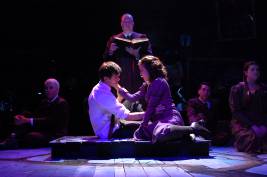 That original German play broke plenty of ground indeed with its depiction of on-and/or-offstage masturbation, child abuse, bondage, rape, abortion, and suicide among 14-year-olds just now awakening to their sexuality. No wonder Wedenkind’s late nineteenth-century shocker wasn’t staged on Broadway until 1916 and ended up closing after a single performance.
That original German play broke plenty of ground indeed with its depiction of on-and/or-offstage masturbation, child abuse, bondage, rape, abortion, and suicide among 14-year-olds just now awakening to their sexuality. No wonder Wedenkind’s late nineteenth-century shocker wasn’t staged on Broadway until 1916 and ended up closing after a single performance.
Very much a groundbreaker in its own way, Sater and Sheik’s musical has proved considerably more successful than its source material, nabbing eight 2007 Tonys including Best Musical, Book, and Score, and running nearly 900 performances on Broadway, one of New York’s most thrilling evenings of musical theater since Rent revolutionized the Great White Way in 1996.
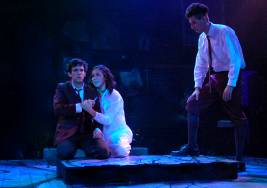 Like Wedekind’s original play, Spring Awakening (The Musical) centers of the lives of its three teenage protagonists: the handsome, popular, self-confident Melchior (Chrys Ryan), his introverted, inhibited, wet-dream-plagued classmate Moritz (Nick Bernardi), and the all-too-innocent but no less sexually inquisitive girl-next-door Wendla (Chelsea Pitillo). We also meet Melchior and Moritz’s ever-horny classmates and Wendla’s equally randy girlfriends, a pair of older actors standing in for all the adults in these teens’ lives.
Like Wedekind’s original play, Spring Awakening (The Musical) centers of the lives of its three teenage protagonists: the handsome, popular, self-confident Melchior (Chrys Ryan), his introverted, inhibited, wet-dream-plagued classmate Moritz (Nick Bernardi), and the all-too-innocent but no less sexually inquisitive girl-next-door Wendla (Chelsea Pitillo). We also meet Melchior and Moritz’s ever-horny classmates and Wendla’s equally randy girlfriends, a pair of older actors standing in for all the adults in these teens’ lives.
What makes Spring Awakening work so brilliantly is not simply Sater’s streamlining of Wedekind’s melodramatic plot threads. Singer-songwriter-pop star Sheik’s catchy alternative rock score, the likes of which had probably never before been heard on a Broadway stage, and Bill T. Jones’ brilliantly innovative choreography turned Spring Awakening into a mainstream (and cult) international phenomenon.
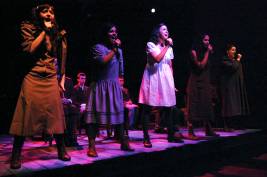 For this reviewer, the magic in Spring Awakening has always begun when the mikes (or mics, if you prefer) come out. The show begins quietly, with sexually burgeoning Wendla wondering if she’ll ever be told the truth about man-woman relations in “Mama Who Bore Me,” followed by a very funny sequence in which her highly embarrassed mother (Lori Lee Gordon) avoids the question entirely, an omission which proves ultimately disastrous. The song takes on a rock beat as Wendla’s girlfriends join her in a reprise, mikes in hand, but it’s a bit later that the hand-mikes begin to take on a life of their own.
For this reviewer, the magic in Spring Awakening has always begun when the mikes (or mics, if you prefer) come out. The show begins quietly, with sexually burgeoning Wendla wondering if she’ll ever be told the truth about man-woman relations in “Mama Who Bore Me,” followed by a very funny sequence in which her highly embarrassed mother (Lori Lee Gordon) avoids the question entirely, an omission which proves ultimately disastrous. The song takes on a rock beat as Wendla’s girlfriends join her in a reprise, mikes in hand, but it’s a bit later that the hand-mikes begin to take on a life of their own.
Melchior and Moritz are in Latin class, the former attempting to rescue the latter from the ire of their monster of a teacher (Sean Harrington), when the burning need to express what’s going on inside their minds and bodies suddenly erupts. As the first chords of “The Bitch Of Living” sound from the onstage band, Melchior draws from within his school uniform a previously-hidden mike, a gesture so defiant (and unexpected), an utterly thrilling moment that from its first viewing made me a Spring Awakening fan for life. (Memo to potential Spring Awakening stagers: If you can’t do it with mikes, don’t do it at all.)
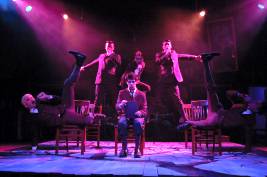 Another reason for my devotion to Spring Awakening has been original choreographer Jones’s Tony-winning stomps and back kicks and leaps and jumps, which took every adolescent urge just bursting to break free and expressed them all in dance.
Another reason for my devotion to Spring Awakening has been original choreographer Jones’s Tony-winning stomps and back kicks and leaps and jumps, which took every adolescent urge just bursting to break free and expressed them all in dance.
Actors’ Repertory Theatre Of Simi’s secret weapon, choreographer Becky Castells, has taken Jones’s cutting-edge dance steps as a point of departure and made them very much her own creation beginning with “The Bitch Of Living,” which integrates exciting new Castells moves into those iconic stomps and jumps, and continuing on to Act Two’s “Totally Fucked,” which has the entire cast contorting as if their sexual wants and their dissatisfaction with the world around them were ants crawling all over their bodies and driving them insane with desire, anger, and frustration.
As it did on Broadway, Spring Awakening in Simi Valley works equally well in its quieter moments, which feature some of Sheik and lyricist Sater’s most memorable compositions. The Pink Floyd-esque “Touch Me,” in which the youthful cast of characters express their desire for intimate physical contact; the anthem-like “I Believe,” which sets the stage for Melchior and Wendla’s lovemaking; and the exquisitely sad “Left Behind,” sung at a funeral for one of the teens are just three among many such songs.
Without these musical numbers, Spring Awakening would simply be an abbreviated version of Wedenkind’s original play, albeit skillfully abridged by book-writer Sater. With them, the struggles of nineteenth-century adolescents seem every bit as relevant to today’s teens as the ones they face on a daily basis, as if twenty-first century souls were inhabiting these long-deceased youths. Melchior, Wendla, and Moritz may have been born in the 1870s, but their dilemmas (like the consequences of Wendla’s insufficient sexual education) still ring true in 2012.
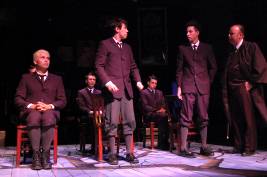 Angelinos who might fear that a scaled-down Spring Awakening in the commuter bedroom community of Simi Valley would not attract the caliber performer the show deserves can rest assured. As previously reviewed productions at the Cultural Arts Center have made abundantly clear, there is no dearth of talent to our north, and with Spring Awakening at the top of so many young triple-threats’ “Must Do” lists, director David Ralphe (at the top of his craft here), choreographer Castells, and producer Jan Glasband had a large, multi-talented group of auditioners to choose from, and to add to the production’s freshness, they have cast it almost entirely with Spring Awakening newbies.
Angelinos who might fear that a scaled-down Spring Awakening in the commuter bedroom community of Simi Valley would not attract the caliber performer the show deserves can rest assured. As previously reviewed productions at the Cultural Arts Center have made abundantly clear, there is no dearth of talent to our north, and with Spring Awakening at the top of so many young triple-threats’ “Must Do” lists, director David Ralphe (at the top of his craft here), choreographer Castells, and producer Jan Glasband had a large, multi-talented group of auditioners to choose from, and to add to the production’s freshness, they have cast it almost entirely with Spring Awakening newbies.
Ryan’s Melchior is less prom king and more student revolutionary here, but the interpretation works, the 23-year-old recording artist bringing his pop star vocals to the role. As Moritz, Bernardi too makes the role very much his own, not quite as weird as his predecessors, but rather an endearing if painfully introverted oddball (with his own terrific set of pipes). Pitillo is a simply exquisite Wendla, both vocally and in her sensitive interpretation of a teenager waking up to her own young womanhood.
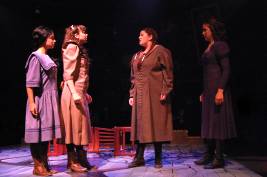 Stephanie Hoston, Cal State Northridge’s Wendla, now sees Spring Awakening through the eyes of runaway abuse victim Isle, a multi-shaded performance which benefits from Hoston’s rich vocals. Francesca Gemma Barletta is heartbreakingly real as Martha, giving a powerful interpretation of her character’s sexual abuse in the haunting “The Dark I Know Well.” Jessamyn Arnstein and Joanna Bert complete the schoolgirl contingent in splendid fashion.
Stephanie Hoston, Cal State Northridge’s Wendla, now sees Spring Awakening through the eyes of runaway abuse victim Isle, a multi-shaded performance which benefits from Hoston’s rich vocals. Francesca Gemma Barletta is heartbreakingly real as Martha, giving a powerful interpretation of her character’s sexual abuse in the haunting “The Dark I Know Well.” Jessamyn Arnstein and Joanna Bert complete the schoolgirl contingent in splendid fashion.
As for the boys, they are a sexy, charismatic bunch indeed, beginning with bleach-blond Quentin Garzon and sweet-faced Julian Comeau, both of them standouts as seducer-and-seduced classmates Hanschen and Ernst. Their Act Two reprise of “The Word Of Your Body” is not only gorgeously sung, it is the most memorable interpretation of the seduction sequence I’ve yet seen, thanks to director Ralphe’s decision to have them (forgive the pun) play it straight—to powerful effect. Nicholas Herbst and Michael Seltzer are excellent too as mother-fixated Otto and piano teacher-obsessed Georg.
Harrington and Gordon are as good as it gets at creating a dozen mostly quite distinct characters (no mean achievement that), with ensemble members Sara Gilbert, Kyle Harrington, A.J. Morales, and Megan Tisler providing expert vocal support, their onstage presence adding a visual link between 19th and 21st Centuries.
Musical director Matt Park has elicited all-around splendid vocal performances from his cast, and if the onstage orchestra doesn’t quite reach their level or have quite the rock concert feel Spring Awakening can attain, it’s refreshing simply to have six musicians adding to the “live” excitement of the production.
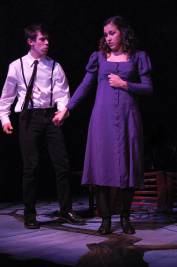 Costumers Gordon and Areilla Seltzer deserve highest marks for creating period garb with a contemporary flair (and for giving the four reform school boys outfits that make amply clear that Comeau, Garzon, Herbst, and Seltzer are playing dual roles). Seth Kamenow’s set is reminiscent of the Broadway design but adds its own original touches (and manages to allow the cast sufficient stomping room despite a relatively small stage area). While not as spectacular as Spring Awakening’s song-and-dance sequences might merit, Courtney Johnson’s lighting design makes maximum use of what the Cultural Arts Center has to offer. Vocals and live accompaniment are skillfully mixed, and there were no mike or amplification problems at the performance reviewed.
Costumers Gordon and Areilla Seltzer deserve highest marks for creating period garb with a contemporary flair (and for giving the four reform school boys outfits that make amply clear that Comeau, Garzon, Herbst, and Seltzer are playing dual roles). Seth Kamenow’s set is reminiscent of the Broadway design but adds its own original touches (and manages to allow the cast sufficient stomping room despite a relatively small stage area). While not as spectacular as Spring Awakening’s song-and-dance sequences might merit, Courtney Johnson’s lighting design makes maximum use of what the Cultural Arts Center has to offer. Vocals and live accompaniment are skillfully mixed, and there were no mike or amplification problems at the performance reviewed.
ARTOS deserves maximum props for not dumbing down or softening Spring Awakening’s more adult aspects. There’s no censoring of “Totally Fucked” (even in the program), one female character’s blouse is briefly, revealingly unbuttoned, there are blink-and-you-miss them bare male buns, simulated masturbation and lovemaking, and some romantic kissing between boys. For this reason, the producers have wisely decreed that “no child under 16 years will be admitted without a parent” and “wish to discourage anyone under the age of 14 from attending this production.” Tea Partiers and religious fundamentalists ought probably to be encouraged to seek their entertainment elsewhere as well.
If I were to make one suggestion, it would be to speed up scene changes by turning them as much as possible into “dissolves” rather that the current “fade out-fade ins” that slow things down a bit.
Kevin Kahm is tech director and Sommer Branham stage manager.
Finding enough talented young performers and then directing and choreographing them with a combination skill and vision makes Spring Awakening a tough assignment for any theater company, particularly one as far off the beaten Los Angeles track as this one is. Actors’ Repertory Theatre Of Simi has more than met this challenge, making for both a fine introduction and a fine new look at one of Broadway’s most exciting 21st Century arrivals.
Simi Valley Cultural Arts Center, 3050 Los Angeles Avenue, Simi Valley.
www.actorsrepofsimi.org
–Steven Stanley
November 2, 2012
Photos: Melissa Miller


 Since 2007, Steven Stanley's StageSceneLA.com has spotlighted the best in Southern California theater via reviews, interviews, and its annual StageSceneLA Scenies.
Since 2007, Steven Stanley's StageSceneLA.com has spotlighted the best in Southern California theater via reviews, interviews, and its annual StageSceneLA Scenies.







 COPYRIGHT 2025 STEVEN STANLEY :: DESIGN BY
COPYRIGHT 2025 STEVEN STANLEY :: DESIGN BY